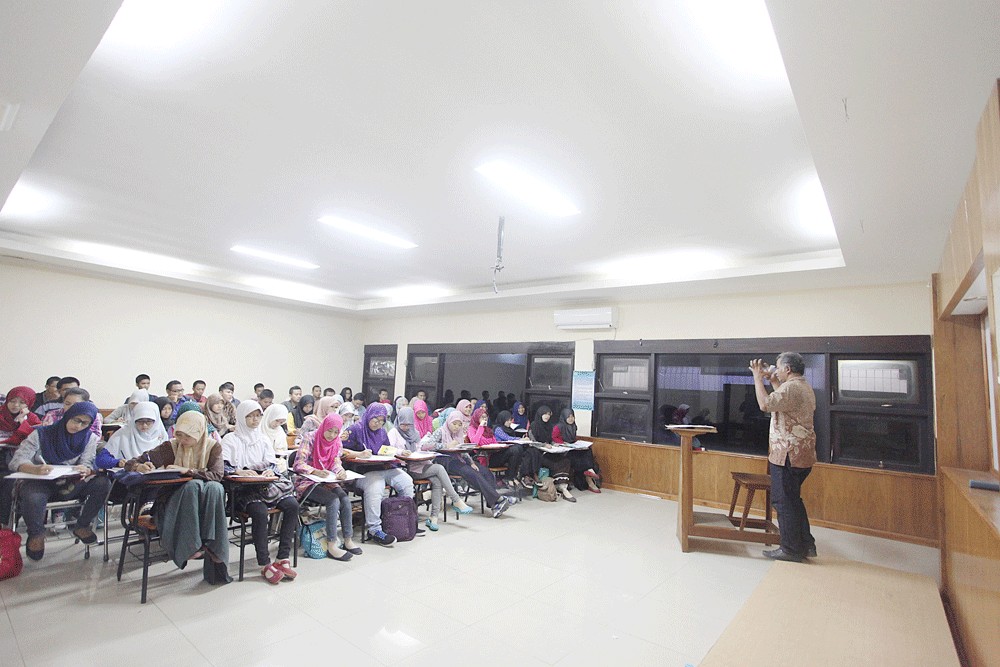Popular Reads
Top Results
Can't find what you're looking for?
View all search resultsPopular Reads
Top Results
Can't find what you're looking for?
View all search resultsLawmakers, academics want education issues ditched from job creation omnibus bill
Change text size
Gift Premium Articles
to Anyone
I
ndonesian lawmakers and academics have demanded education issues be scrapped from the omnibus bill on job creation, arguing that some provisions within the draft may end up being "counterproductive" to the efforts to improve quality education in the country.
The bill, currently being discussed by the House of Representatives and the government, would amend a number of articles in Law No. 20/2003 on the national education system, Law No. 14/2005 on teachers and lecturers as well as Law No. 12/2012 on higher education.
A number of House members, especially those with close ties to Indonesia's largest Islamic organization Nahdlatul Ulama (NU), raised concerns over some articles they deemed would commercialize the education sector and turn it into a business commodity.
For instance, they criticized a provision in the draft bill -- a copy of which was obtained by The Jakarta Post -- that changes the principle of nonprofit management for higher education institutions as an option instead of an obligation as initially stipulated in the 2012 law.
House Legislation Body (Baleg) member Abdul Wahid of the National Awakening Party (PKB), which is regarded as the unofficial political wing of NU, criticized the revision, emphasizing that the country should have responsibility for ensuring access to education.
"I'm afraid that this will endanger the nation. Don't commercialize education,” Abdul said during a hearing between Baleg and the government on Tuesday.
Hasani Bin Zuber, a member of House Commission VIII overseeing social affairs from the Democratic Party, further raised concerns over an article in the bill requiring people to secure a business license from the central government to establish education institutions, including Islamic boarding schools (pesantren).
The bill also stipulates a fine of up to Rp 1 billion (US$66,834) for those who fail to obtain a license.
Read also: Govt prepares implementing regulations for omnibus bill on job creation
"I think we should review the revisions so they don’t become a problem in the future," said Hasani, who is also known as an NU activist.
Chairman of House Commission X overseeing education and PKB politician Syaiful Huda touted the articles in the education cluster of the draft bill to be "counterproductive to the philosophy and objectives of education in Indonesia."
"This will have an impact on the tradition-based educational institutions such as pesantren [Islamic boarding schools] and will increase the costs of education," Syaiful said.
Indonesia is home to some 4,670 universities and other higher education institutions, 122 of which are state-run universities while the rest are private institutions.
Of the figure, NU operates around 257 higher-learning institutions, which are among up to 6,000 education institutions -- ranging from kindergartens to universities -- run by the Islamic organization in the archipelago.
The group also runs more than 23,000 pesantren of up to 29,000 Islamic boarding schools in Indonesia, according to NU data.
Lecturers and teachers also voiced concerns over the revision.
Hariadi Kartodihardjo of the Board of Professors at Bogor Agricultural University (IPB) in West Java highlighted the elimination of all requirements for foreign universities to operate in Indonesia.
The bill scraps, among other things, the requirement for foreign universities to be accredited and relaxes the obligation for them to collaborate with domestic higher-learning institutions.
Hariadi argued that facilitating investment in higher education without accreditation standards could reduce its quality, saying that foreign universities should obtain accreditation both in their country and in Indonesia.
Read also: ‘It’s to prevent sexual violence’: UI clarifies, rebuffs criticism against consensual sex topic
“We don’t want Indonesia to have too many universities that don’t necessarily benefit the nation," he said.
"Many other countries, for example, Japan, have succeeded in increasing global competitiveness not by opening investment for foreign universities but focusing on increasing the capacity of their universities to conduct research and development, including cooperation with businesses."
The Indonesian Teachers Association (PGRI) argued the bill would lead to discrimination against teachers who graduated from domestic universities.
The bill stipulates that teachers or lecturers with a bachelor's degree from an accredited foreign university are no longer required to have an educator certificate, while those who obtained their bachelor's degree from a domestic university are still required to have one.
PGRI chairwoman Unifah Rosyidi called on the House to drop the education cluster from the bill, which generally aims to ease business licensing and attract investment.
“The PGRI demand the House and the government exclude the education cluster from the bill and they could make a separate omnibus bill,” she said, questioning the need for the issues to be included in the bill.
Elen Setiadi, an expert staff member at the Coordinating Economic Ministry, said during Tuesday's hearing that Indonesia had to catch up in science and innovation so some relaxations on regulations related to the education sector were necessary.
“Science and innovation development requires a large investment," Elen said, "The state is still responsible for the educational system without being profit-oriented.”










